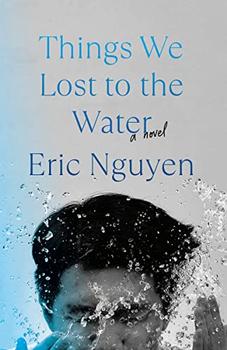Summary | Excerpt | Reviews | Beyond the book | Read-Alikes | Genres & Themes | Author Bio

Spanning over 30 years, Eric Nguyen's debut novel Things We Lost to the Water is epic in scope but finely tuned into its characters' perceptions, anxieties and fraught relationships. It is an immigration story and a family narrative about secrets that divide and experiences that bind people together over decades and across oceans. Nguyen is a masterful composer, pulling readers close with quiet moments of striking emotion and then widening the scope for sonorous knells of grand devastation.
In 1978, Hương is in her early 20s and pregnant with her second child when she flees Saigon by boat with her young son, Tuấn. Her husband, Công, is supposed to come with them, but at the last moment they are separated. The boat takes Hương and Tuấn to Singapore, where Hương gives birth to her second son, Bình, and a refugee organization arranges to send them to New Orleans. From there, Hương sends letters, and later cassette tape recordings, back home as she waits for the day Công will join her in the United States. That day never comes.
The novel alternates perspectives between Hương, Tuấn and Bình. The boys grow up in East New Orleans in a Vietnamese housing project called Versailles (see Beyond the Book), and Nguyen provides a panoramic view of this insular community, where the children play a game called "I'm not American." It's a modified version of capture the flag based on what the kids must have heard about the Vietnam War from their parents (the game involves yelling, "The Americans are killing our people! The Americans are killing our crops!") but it's also a representation of defiance. This is not a narrative of grateful refugees finding a new home in the melting pot. There is no assimilation story here.
In one scene, Hương has a rare night on the town with a friend from work, Kim-Anh, who lives with her white American boyfriend, a man who tearfully tells Hương when Kim-Anh is out of earshot, "I saved her, you know." He calls her "Kim" and "Kimmie" and each time Kim-Anh corrects his pronunciation: "Keem-On." From Hương's conversation with him, it is clear the man expected something in the way of a demure Vietnamese wife in exchange for "saving" Kim-Anh. But that is not what he gets. Instead, she buys drinks with his money and dances with other men while he watches with increasing bitterness.
Nguyen's narrative voice is ruthless and very funny. In addition to the absurdity of the "I'm Not American" game, he recreates the nuances of southern patois with a vengeance, describing at one point a phrase Hương learns and employs often with her customers at the nail salon:
"Bless your heart," which meant, secretly, that they were dumb or lacking mental faculties or were otherwise impaired, but there was not a thing to be done about it—how pitiful they were, how one could pity them all day long until the cows came home. She said it to them all the time: Bless your heart! Bless your heart! Bless, your, heart!
Tuấn gets the short end of the plotlines. He briefly joins a street gang as a teenager before fading into the background while the more complex and fully formed Bình takes the stage. After a brief romance with another boy, Bình disappears into the gay club scene, where he feels like himself for the first time. But he also suffers the wrenching disappointments, heartache and shame about his sexuality that will likely be familiar to a majority of queer readers.
Life pulls the family apart. The boys become young men and strain in different directions, their mother left behind at Versailles. Hương and Bình have a terrible fight that becomes a years-long rift. But during the novel's cinematic climax, the family pulls together across their great distances, physical and metaphorical. All that has been unstitched feels momentarily mended, even as the world around them is torn asunder.
Despite some lulls in the Tuấn storyline and perhaps an overabundance of water-related metaphors, this is an exceptional debut novel. Nguyen works background and historical information into the text without breaking narrative stride, capturing the aftereffects of the Vietnam War as an integral part of family lore. The story is an artfully constructed arc, yet also full of small, meaningful vignettes in which ancillary characters, such as Kim-Anh, are given their brief moments of brilliance. Hương, Tuấn and Bình are delicately refined, and reify the experience of being swept up and scattered by the storm of diaspora.
![]() This review was originally published in The BookBrowse Review in June 2021, and has been updated for the
May 2022 edition.
Click here to go to this issue.
This review was originally published in The BookBrowse Review in June 2021, and has been updated for the
May 2022 edition.
Click here to go to this issue.

If you liked Things We Lost to the Water, try these:

by Randy Ribay
Published 2025
From the author of the National Book Award finalist Patron Saints of Nothing comes an emotionally charged, moving novel about four generations of Filipino American boys grappling with identity, masculinity, and their fraught father-son relationships.

by Catherine Dang
Published 2025
A haunting coming-of-age tale following the daughter of Vietnamese immigrants, Ronny Nyugen, as she grapples with the weight of generational trauma while navigating the violent power of teenage girlhood, for fans of Jennifer's Body and Little Fires Everywhere.
Your guide toexceptional books
BookBrowse seeks out and recommends the best in contemporary fiction and nonfiction—books that not only engage and entertain but also deepen our understanding of ourselves and the world around us.